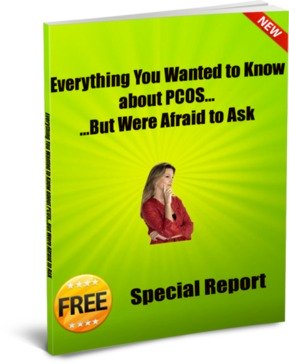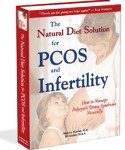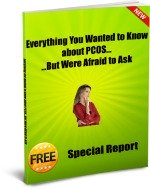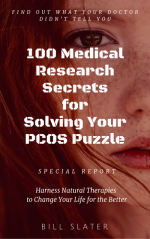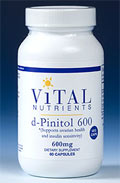PCOS Review Newsletter #76
1) Improve Your Self Image with Exercise
1) Improve Your Self Image with Exercise
We do a considerable amount of purposeful exercise daily, plus we make conscious choices to be physically active in simple ways, like climbing stairs rather than using elevators, or parking some distance from our destination and walking a bit to arrive. How are you doing with your exercise?
Exercise is a crucial component of your personal program for gaining the upper hand over polycystic ovary syndrome. We've spoken before about how important exercise is for controlling insulin and balancing your hormones and metabolism.
Here we'd like to discuss how exercise relates to how you feel about yourself. Many of you have told us that you are unhappy or depressed about how your body looks, especially if you are overweight or suffer from acne or hirsutism.
And some of you have told us that in spite of exercise, you had difficulty losing weight and gave up your exercise program.
Recent medical research indicates that regardless of whether you lose weight or not, you should continue to exercise. Why? Because you will feel better about yourself.
This study was conducted by the University College London. Thirty five overweight women with PCOS were put on a program of brisk walking for six months.
At the end of six months, 23 women showed up for a reassessment; 12 completed their exercise program and 11 did not. After the six months, neither group had significantly improved their height-to-weight ratio.
However, those who did the walking for six months reported significantly improved feelings about their bodies, even though they didn't lose much weight.
Bottom Line: If you consistently exercise, you will feel much better about yourself. Make it a lifetime habit. It will pay huge dividends in terms of your health and self-image.
Source:
Liao LM et al, Exercise and body image distress in overweight and obese women with polycystic ovary syndrome: a pilot investigation, Gynecol Endocrinol. 2008 Oct;24(10):555-61
2) Hidden PCOS Time Bomb?
Has your doctor talked with you lately about the relationship between PCOS and the risk of developing cardiovascular disease?
There is plentiful medical research to establish that women with polycystic ovary syndrome have a higher risk of developing heart and blood vessel disease.
We bring this up now because we just came across yet another study that demonstrates your increased risk.
The University of Adelaide in Australia has reported that women with PCOS have abnormal platelet function compared to women who don't have PCOS.
Platelets are primitive cells in your bloodstream that control blood clotting. They also send out powerful biochemical signals that alter many functions in your body. Some of these biochemicals can create problems.
The Australian researchers compared 12 lean and 12 overweight PCOS women to 12 women who did not have PCOS.
Both the lean and overweight PCOS women had disturbed platelet function when compared to the normal women. In fact, they titled their report: "Polycystic ovary syndrome is associated with severe platelet and endothelial dysfunction in both obese and lean subjects."
They conclude: "We conclude that in PCOS subjects, independent of obesity and associated insulin resistance, profound and reproducible impairment of platelet responsiveness to NO [nitric oxide] is an additional component of cardiovascular homeostatic disturbance."
It's uncommon to find a research report that uses the words like "severe" and "profound". Without going into all the medical-technical details, suffice it to say that platelet dysfunction is a clear risk for various kinds of cardiovascular problems, to say nothing of other disturbances such as systemic inflammation.
OK, so maybe you have a platelet problem. What might you do about it?
First, if you're taking birth control pills, you could ask your doctor if there is any relationship between birth control pills and your platelets. A research report from the Universidad de Alcala in Spain said: "Oral contraceptives and metformin may exert deleterious effects on blood clotting tests of PCOS women "
Second, a healthy diet, like the one described in The Natural Diet Solution for PCOS and Infertility book, is protective of your cardiovascular system. For example, we recommend that nuts be part of your diet. A recent study from the Universidad Complutense de Madrid in Spain showed that platelet function was improved when walnut paste was added to meat. Don't be afraid of walnuts or other nuts because you think they are "fattening". Actually, they are quite healthy (if raw).
Third, selected nutritional supplements such as fish oil can be very beneficial. Fish oil components can help to normalize platelet function and has other heart-healthy benefits, according to research at Oxford University and other sources.
The cardiovascular risk of PCOS is not something to be swept under the rug. Your best strategy is to start right now to reduce your risk. Remember, the absence of obvious symptoms do not mean you are free of risk.
Sources:
Rajendran S et al, Polycystic ovary syndrome is associated with severe platelet and endothelial dysfunction in both obese and lean subjects, Atherosclerosis. 2008 Sep 17. [Epub ahead of print]
Luque-Ramírez M et al, Effects of an antiandrogenic oral contraceptive pill compared with metformin on blood coagulation tests and endothelial function in women with the polycystic ovary syndrome: influence of obesity and smoking., Eur J Endocrinol. 2009 Mar;160(3):469-80
Canales A et al, Platelet aggregation, eicosanoid production and thrombogenic ratio in individuals at high cardiovascular risk consuming meat enriched in walnut paste. A crossover, placebo-controlled study, Br J Nutr. 2008 Dec 10:1-8. [Epub ahead of print]
Hartweg J et al, Potential impact of omega-3 treatment on cardiovascular disease in type 2 diabetes, Curr Opin Lipidol. 2009 Feb;20(1):30-8
3) Thank Others
Why not take 5 minutes out of each day to write a thank-you note to say "thank you" to someone for something? It could be something they did yesterday, or a year ago. Thank those to whom you are genuinely grateful.
Don't expect or ask for anything in return when you do this. You dont have to make it gushy or effusive either. Simply, "Hi, I was thinking back and remember when you did *this*, and just wanted to say thanks because I appreciated it."
Not only will you make the other person feel good, but youll start to remember some of the good things others have done for you, which will make you feel good too.
Why is this important?
Our own lives are made better by the good will that we surround ourselves with.
People are attracted to positive, bright, forward-thinking people, and to people who remember and appreciate others. The idea is to make yourself the kind of person that others gravitate to and enjoy being around. You dont have to go overboard -- in fact, its far wiser not to. Keep your actions very simple.
Thought for Today: "At times our own light goes out and is rekindled by a spark from another person. Each of us has cause to think with deep gratitude of those who have lighted the flame within us." -- Albert Schweitzer
PCOS Health Review
This free newsletter gives you original and immediately usable information to help you deal with PCOS.
Get the latest research, tips for improving your health, answers to questions, success stories, and more!
Your e-mail address is totally secure. We will never misuse your information.
Enter Your Email Above to Subscribe Today
and Get Your Questions Answered in this Free Special Report!
